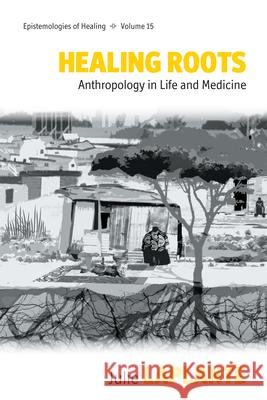Healing Roots: Anthropology in Life and Medicine » książka
Healing Roots: Anthropology in Life and Medicine
ISBN-13: 9781782385547 / Angielski / Twarda / 2015 / 302 str.
Healing Roots: Anthropology in Life and Medicine
ISBN-13: 9781782385547 / Angielski / Twarda / 2015 / 302 str.
(netto: 479,18 VAT: 5%)
Najniższa cena z 30 dni: 498,70
ok. 30 dni roboczych
Dostawa w 2026 r.
Darmowa dostawa!
"This book represents an interesting addition to the emerging series of articles and books dedicated to the study of the interactions between Western and African systems of knowledge... It] is very provocative and will no doubt provoke many intellectual debates." - Gilles Bibeau, Universite de Montreal Umhlonyane, also known as Artemisia afra, is one of the oldest and best-documented indigenous medicines in South Africa. This bush, which grows wild throughout the sub-Saharan region, smells and tastes like "medicine," thus easily making its way into people's lives and becoming the choice of everyday healing for Xhosa healer-diviners and Rastafarian herbalists. This "natural" remedy has recently sparked curiosity as scientists search for new molecules against a tuberculosis pandemic while hoping to recognize indigenous medicine. Laplante follows umhlonyane on its trails and trials of becoming a biopharmaceutical - from the "open air" to controlled environments - learning from the plant and from the people who use it with hopes in healing. Julie Laplante is Associate Professor of Anthropology in the School of Sociological and Anthropological Studies at the University of Ottawa. Senior research fellow at the Max Planck Institute fur etnologische forschung (2006-2010), she has published in numerous journals and is the author of Pouvoir Guerir. Medecines autochtones et humanitaires (Power/Ability to Heal. Indigenous and humanitarian medicine).
"This book represents an interesting addition to the emerging series of articles and books dedicated to the study of the interactions between Western and African systems of knowledge...[It] is very provocative and will no doubt provoke many intellectual debates." · Gilles Bibeau, Université de MontréalUmhlonyane, also known as Artemisia afra, is one of the oldest and best-documented indigenous medicines in South Africa. This bush, which grows wild throughout the sub-Saharan region, smells and tastes like "medicine," thus easily making its way into peoples lives and becoming the choice of everyday healing for Xhosa healer-diviners and Rastafarian herbalists. This "natural" remedy has recently sparked curiosity as scientists search for new molecules against a tuberculosis pandemic while hoping to recognize indigenous medicine. Laplante follows umhlonyane on its trails and trials of becoming a biopharmaceutical - from the "open air" to controlled environments - learning from the plant and from the people who use it with hopes in healing.
Julie Laplante is Associate Professor of Anthropology in the School of Sociological and Anthropological Studies at the University of Ottawa. Senior research fellow at the Max Planck Institute für etnologische forschung (2006-2010), she has published in numerous journals and is the author of Pouvoir Guérir. Médecines autochtones et humanitaires (Power/Ability to Heal. Indigenous and humanitarian medicine).











